Eight myths about castration of cats. We understand the important issues of cat castration surgery.
If you have any questions and want to receive a qualified answer to them, you can ask your questions in the comments or through the form.
- Question. What is sterilization and what is castration?
Answer. This is an operation to remove the sex glands - testicles or ovaries (often along with the uterus). Removing a cat's testicles is called castration, and removing a cat's ovaries is called neutering.
- Question. Why do this?
Answer. Sexual behavior and instincts are inherent in every living creature, both humans and cats. But even if you love your cat very much, do not look for the “human” in them, and even more so, do not identify them with people. Cats are wonderful animals, but they are just animals. And the sexual sphere of cats and cats is fundamentally different from the human one. Your sex life normal person builds on the basis of conclusions of reason, love - that is, on feelings. In cats, this is pure physiology. And if normal and mentally healthy man may completely give up sexual activity, for example, if a loved one is away, or, for example, due to religious beliefs, then a cat cannot “give up instincts” completely. “I WANT IT IMMEDIATELY, and don’t let the cat go!” - so things are tough for them.
Instinct forces a cat to reproduce several times a year. Without receiving a cat, the cat will torture itself and its owners with heart-rending screams and meows day and night, and refuse food. Both cats and cats can mark (spray) extremely smelly urine on the shoes and clothes of their owners. Know: this is not “revenge” or “meanness” - it’s just instinct and its manifestations. In this way, animals spread their odors in nature so that they can be found by individuals of the opposite sex. They do this in the apartment too.
These days, special mucus is secreted from the cat’s genitals, and the animal can stain the owners’ bed with it (or even excrement). Of course, you cannot punish for this in any case - the animal is not to blame, and cannot control its physiology!The period when instincts appear is called estrus in cats.
Both male cats and female cats can become aggressive. Moreover, their behavior becomes unsafe for themselves: they climb onto the windowsills near an open window and often, falling from a height, are injured or killed.
A cat can howl for weeks, demanding a cat. Even if you “arrange him a date” with a cat, this will not last long - soon everything will start all over again. The cat becomes “insane,” but this is again by “human” standards. In fact, he is guided by instincts that completely dictate his behavior. Both a cat and a cat in this state can easily sneak through a barely open door and end up on the street... This can lead to the death of a pet. Outside his native walls, many dangers await him: they can be torn apart by dogs, run over by a car... Your beloved cat or tom may fall into the hands of flayers or into the pan of homeless people... Yes, alas, this also happens.
Related video: Why spay or neuter a cat?
- Question. Isn't it cruel to deprive a proud cat or a sweet kitty of pleasure?
Answer. To argue this way is again to try to model human motives and behavior on cats. In fact, if you have seen the process of mating cats, then you will understand that they do not experience any pleasure. If you want, for them this is a cruel instinctive model of behavior: to mate and produce offspring at any cost. “Sex for pleasure” is unknown to cats; on the contrary, it is torture for them, but they cannot resist the instinct. Perhaps these words did not convince you of the need for castration. Then you need to try on the role of a cat breeder-felinologist - a person who breeds cats professionally. He tries to carefully plan everything in advance. Even owners are found for kittens even before they are born! But you're not a professional, are you? What will happen to your personal “nursery”?

Let's estimate... So, your cat is capable of becoming pregnant, carrying and giving birth four times a year. There are three, often four, often even more kittens in a litter. Think about it - that's about 10-15 cats per year from one cat! What will you do with them!? Are you sure that you can place such a number of animals with your friends? Or will you kill kittens by drowning them and throwing the corpses in the trash? Maybe you will throw kittens under doors at night, from where they will end up on the street, where they will soon die a terrible death? Maybe you will leave the ten to one and a half cats born every year in your apartment or house? But a cat reaches puberty at eight months. And instinct will make each of them demand a cat. If everything goes the “natural” (and essentially barbaric!) way, in a year you will have not 10-15, but almost fifty cats and kittens! Have you imagined this hell, primarily for fluffies? Isn’t it better to castrate or sterilize a cat in order to save animals and their offspring from a number of diseases and suffering, and at the same time to save yourself, your loved ones and neighbors from troubles and even horrors?
- Question. Is it possible to replace the castration and sterilization operation with something else?
Answer. Yes, there are drugs in the form of tablets, powders, mixtures, and injections that can suppress the sexual instincts of cats. However, they are all far from harmless. These are strong hormonal drugs that seem to resist the cats’ own hormones and suppress the production of their own. Such a “war of hormones” in an animal’s body can lead to complications and even serious illnesses, including mammary gland cancer in cats and male cats, and purulent inflammation of the uterus in cats. If you decide to use such drugs, then only consult a veterinarian for advice on their use. But remember: Sterilization and castration is the best method to avoid suffering for both the animal and its owners. After it, no chemical hormones need to be given.
- Question. How is the operation done?
Answer. First of all, there is preparation for the operation. It depends on the age and general condition of the animal. For healthy cats and kittens, spaying or neutering is best done between 6 and 8 months of age. But this operation is also performed on older animals. True, by this time an animal that has not been castrated on time often receives a “bouquet” of diseases, which requires special attention specialist Animals must also be vaccinated before surgery. Any cat should fast for half a day immediately before surgery. It is not difficult. As a rule, they are taken to surgery in the morning, so you don’t need to feed in the evening.
Castration in cats is a fairly simple and quick operation. Veterinarians are trained in this operation first of all, it is so simple. The testicles are removed surgically, under anesthesia, and your cat won’t even feel anything. The operation lasts several minutes, plus some time for preparation. If you wish, you can watch a video of the operation.

Immediately before the operation (even before the operating room), the animal is examined and the necessary examination is carried out. If there are no contraindications to the operation, then both male and female cats are given so-called premedication before it: drugs are administered that calm the animal and cause drowsiness. Then the incision site can be trimmed so that long hair does not get into the surgical incision - it subsequently grows back quickly. The animal is then transferred to the operating room.
There the animal is given anesthesia. Your cat quickly falls asleep and doesn’t feel anything. While they are sleeping, the veterinarian, through a very small incision in the skin, gains access to the necessary organs: the testicles of a cat, or the ovaries of a cat. They are removed. It should be noted that the operation of sterilization of cats is much more complicated than the operation of cats, due to anatomical differences. Here the experience of the operator plays an important role. It is very good if the veterinary clinic is engaged in charity and runs a shelter for homeless animals. All such animals are not only treated and vaccinated there, but also castrated or sterilized, so the specialists of such a clinic have, as they say, “a full hand,” that is, vast experience in such operations.
During the operation itself, special surgical threads are often used to close the incisions, which themselves dissolve without a trace in the body and do not require the removal of sutures. The animal is also given a long-acting antibiotic injection, which protects the surgical site from suppuration. After all the surgical procedures, the animal is still asleep, and in a state of sleep goes home, or remains in the clinic under observation until it completely recovers from anesthesia, and only then the owners take it back to its home.
- Question. How to care for a cat immediately after castration?
Answer. As a rule, after anesthesia, the animal sleeps for another half hour to two to three hours. Caring for it is simple, but requires attention. The eyes may be open during post-anesthesia sleep. To prevent them from drying out (risk of eye inflammation), close the cat’s eyelids every 5 minutes. Since the cat may not control its physiological functions (it may urinate on itself), it must be placed on a waterproof bedding placed on the floor. You can hold your pet in your arms until he wakes up. The operated cat should be covered with a woolen blanket or something else, light and warm. If the animal trembles after surgery, take it as normal.
When waking up, the cat may walk slowly, stagger, try to sluggishly jump higher or hide somewhere. Calm him down and don’t let him do this - he still doesn’t “realize” what he’s doing, so he may fall and get injured. You can feed your cat 6-12 hours after complete recovery from anesthesia.
- Question. How to care for a cat immediately after sterilization?
Answer. The operation of sterilizing a cat is much more complicated than castrating a cat, because the ovaries are located in the abdominal cavity. Therefore, an incision is made on the anterior abdominal wall to gain access to the inside of the abdomen. However, surgical techniques have been developed and have long been used to minimize the risk of complications, and anesthesia and antibiotics make the postoperative period smooth.
Differences in the management of the postoperative period and the recovery period of a cat differ slightly from that of a cat. The cat will need a so-called bandage (“blanket”), which covers the stomach and is tied with ribbons on the back. It will prevent the animal from scratching or “licking” the seams with its tongue. The cat will wear it for several days until the surgical incisions are completely healed.
Caring for a cat after sterilization is no different from caring for a cat that has been operated on, except that the cat is in surgery longer, so it may take longer to wake up.
Castration is performed on cats living at home. This procedure involves removing the reproductive glands. It is carried out after full puberty. If you decide to place a purring pet in your apartment, find out how cats are castrated. A simple surgical operation will help adapt your beloved animal to home conditions. After castration, do not leave the cat bad smell, marking the territory. He will never become aggressive. Cohabitation with a neutered cat will be pleasant for the whole family.
Why are cats castrated?
Before deciding to castrate your beloved pet, everyone man of sense think about why this is necessary. Domestic cats rarely have the opportunity to mate, so their natural attraction to females causes many problems for owners. When thinking about whether to castrate a cat or not, you must clearly understand that the discomfort arising from forced abstinence ruins the animal’s life. Once you realize this, you will understand why you need to castrate.
The next question that arises in the mind of a caring owner is how castration affects a cat. Intensive care will be required for several days after surgery. After anesthesia, a cat will not be able to move independently, so you will have to feed it and even carry it to the toilet. For pet lovers, the pros and cons of spaying/neutering are often a topic of debate. After removal of the gonads, cats forget about their natural attraction to females, and therefore concentrate on communicating with humans.
Types of castration of cats
Veterinary clinics have two options for “disabling” reproductive functions:
- Emasculation. A classic operation involving surgical removal of the testicles. The clinic will tell you in detail how domestic cats are castrated.
- Sterilization. A procedure in which the spermatic ducts are ligated. In this case, all organs and glands remain in their places.
As a rule, owners of domestic cats choose traditional castration, since after sterilization all the unpleasant consequences remain. The cat retains sexual desire, he yells, shows aggressiveness, and so on. Some pet lovers believe that testicular amputation is dangerous, but experts assure that there is nothing wrong with it. With proper care, you will not have to worry about the sutures becoming swollen. Complications after castration occur extremely rarely, in unforeseen cases.
When to castrate
If you have a small kitten, you should not rush to plan castration. At an early age, sexual characteristics that cause discomfort do not appear. In addition, this cannot be done until 7-8 months for physiological reasons. The pet may simply die. The optimal age to castrate/sterilize a cat is 8-12 months. Adult males tolerate the effects of anesthesia with serious complications. The recovery period after surgery lasts much longer in mature cats.
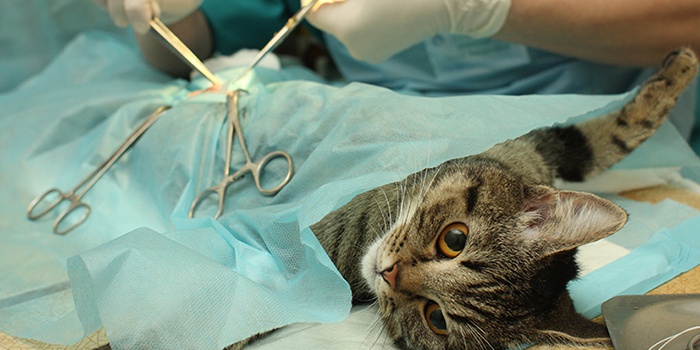
How does castration occur?
Anyone who is thinking about castrating a purring pet should know how domestic cats are castrated. First of all, anesthesia is administered. The next step is to remove hair from the scrotum using a razor. Next, the doctor makes two small incisions on the skin with a scalpel, tightens the spermatic canal, and then removes the testes. In most cases postoperative sutures not required. The total duration of the procedure is up to 5 minutes. The described method has been tested many times in practice, so there is no danger in it. The most difficult task is removing the cat from anesthesia.
How to prepare a cat
If you decide to castrate your cat, you must take preoperative preparation seriously. First of all, examine the animal in the clinic. Visit your physician and cardiologist to make sure there are no contraindications. Once this is done, select your surgery date. The last two days before the appointed time, carefully monitor the animal. Report any unusual behavior to your doctor. To ensure the operation goes smoothly, stop feeding the cat 12 hours before the administration of anesthesia.
How much does the procedure cost?
If you are thinking about how much it costs to castrate a cat, the table below will help you figure it out. It shows real prices stated by veterinary clinics in Moscow. Check out these numbers to get an idea of the financial side of neutering your cat. At first glance, the services of specialists may seem expensive, but for the benefit of your beloved animal, you should not skimp.
| Clinic name | Address | Service | Price, rub |
| "VetCom" | 1st Tverskaya-Yamskaya, house No. 14; Website: kastratia | Castration at home | |
| "Breeze" | st. Shkuleva, house No. 5, building 1; Website: veter-ok | Castration in the clinic | |
| Castration at home | |||
| micro Severnoe Chertanovo, house No. 5G; Website: bembivet | Castration | ||
| Castration of cryptorchid | |||
| "Cybele" | Moscow, North-Eastern Administrative District, Mira Avenue, building No. 186, building 1; Website: kibelavet | Castration | |
| Castration of cryptorchid |
Caring for a cat after castration
When the worst moment passes, the pet will need care and attention. Upon awakening from anesthesia, the cat will experience muscle weakness, thirst, nausea and dizziness. This will last about three hours, so be prepared to provide support. After surgery, the cat may experience the following unpleasant surprises:
- Dryness of the conjunctiva. During anesthesia, cats' eyes remain open, so the mucous membranes dry out. To prevent negative consequences, you will have to periodically close the cat’s eyelids so that the conjunctiva is moistened.
- Decreased body temperature. The normal value for cats is 37.5-39°C. after anesthesia, the temperature will drop by 1.5-2 degrees. Trembling will appear, but there is nothing to worry about. Transfer the cat to a soft cloth and cover with a towel.
Unsteady gait. Anesthesia causes muscle relaxation, so the cat will look like a drunk for some time. Let him roam around the apartment, but don't let him jump on tall objects. Such attempts will end in a painful fall.

What to feed
For a cat who has undergone anesthesia, diet is extremely important. The owner's task is to provide the pet with proper feeding in moderate quantities. Write down a few for yourself useful tips that will help bring your pet out of a severe postoperative condition:
- More meat feed. After castration, give your cat boiled turkey, chicken or beef. Minimize portion sizes to avoid overloading your stomach.
- Dairy products. Introduce sour cream, kefir and cottage cheese into your cat's diet. The fat content of these products should not exceed 5%.
- Dry food. Buy a package of Proplan, Hills or Royal Canin Premium food for your pet. Combine food with other foods to add variety to your diet.
- Fish. You should never forget about a cat’s favorite treat, especially after castration. Give your pet some fish at the end of each meal.
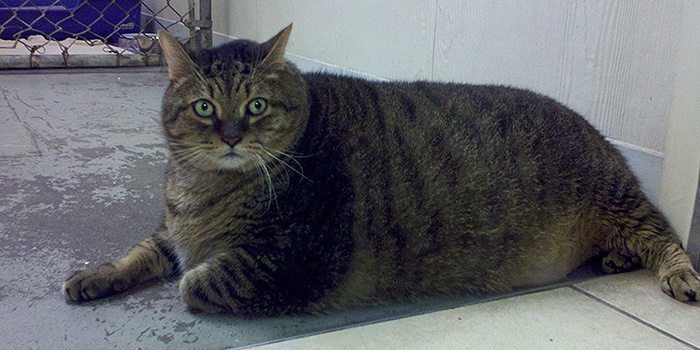
Consequences
As a rule, castration of animals takes place without negative consequences, but no veterinarian will give you a complete guarantee of the absence of complications. Each cat may have its own problems:
- Internal bleeding. Unlikely, but possible. The presence of this problem is evidenced by the lethargic, passive state of the cat after castration. Your attempts to touch or stroke your pet will cause him pain. The main sign of internal bleeding is pallor of the mucous membrane in the oral cavity. If you notice this, take your cat to the vet immediately.
- Vomit. Severe, uncontrollable vomiting in a cat after castration does not bode well. If she is accompanied by decreased appetite, drowsiness, increased body temperature and weakness, immediately go to the doctor.
- Wound infection. Redness, swelling, and swelling in the area around the scalpel incision site. These manifestations are considered normal during the first 3-4 days after castration. If the inflammation intensifies, it means that the wound has become infected and your cat is in danger.
- Obesity. Anesthesia disrupts the hormonal balance in a cat’s body and slows down metabolism. In most cases, after castration, the animal’s condition returns to normal, but sometimes the situation worsens. Obesity appears. To prevent the problem, consult your veterinarian. The specialist will tell you how to provide your pet with a normal diet and physical activity.
Behavior
When the anesthesia wears off, the cat will feel that there is nothing left where he had eggs before. The state of shock will last for several days. Your task is to constantly pay attention to the cat. Take your pet in your arms, play and talk to him. The owner's voice has a calming effect. Familiar intonations provide a feeling of security.
A week after castration, the pet will return to its normal lifestyle, but much of its behavior will change. Uncastrated animals feel sexual desire, and therefore often ask to go outside. Castrated cats concentrate more on communicating with humans. They become balanced and calm, but at the same time continue to show interest in toys.
Is it possible to successfully castrate a cat yourself?
Some pet lovers wonder whether it is possible to castrate a cat yourself. The answer from the experts: no, no, and no again! Castration of a cat is a surgical operation that requires sterility, special instruments and experience. All of the above is available only from qualified veterinary clinic specialists. Even if you know everything about how cats are castrated, do not try to repeat it at home. Experimenting with manhood your Scotsman or Briton, you can simply kill him!
Video: cat castration
If you want to find out in detail how cats are castrated, watch the video below. He clearly demonstrates all stages of testicular removal, from preparation to suturing the incisions. During this process, experts explain every step the surgeon takes so that people considering neutering their cats clearly understand what the operation entails.
By taking an animal into your home, a person assumes certain responsibilities. The life of a pet now depends entirely on the owner; all aspects of it are controlled by the person. Castration - safe way adapt your pet to atypical living conditions. When making a decision, you must act only in the interests of four-legged friend, based on his physiology, without being guided by his own beliefs.
Opponents of castration consider this procedure inhumane, criminal, and see in it only a manifestation of selfishness. They talk about unnaturalness, interference in nature, disability of defenseless creatures. But facts remain facts, whether we admit them or not. The pros and cons of the procedure are a series of arguments and counter-arguments, after studying which the owner will be able to make an informed decision.
1. Castrating a domestic cat is pointless and selfish, because he does not have contact with females
An uncastrated cat living in an apartment and not having the opportunity to satisfy its natural needs behaves as its instincts tell it. He leaves marks so that females can find him, and damages wallpaper and furniture to relieve tension. An affectionate kitten can become angry and distrustful: biting, scratching, hissing for any reason. The owner constantly punishes the pet, which only makes the situation worse. The pet’s behavior changes after castration: the hormonal levels stabilize, the ladies’ man stops inviting females, the aggression goes away, as the feeling of chronic dissatisfaction has disappeared. The owner’s nervousness also disappears: now it’s pleasant to communicate with the cat, the furniture is out of danger, the disgusting smell has disappeared. A cat that receives enough attention and affection lives happily and carefree. He loses the feeling of uncertainty and fear that appeared during moments of punishment and shouting.
The cat marks for some time after the procedure, as the level of sex hormones decreases gradually. After a couple of months, and sometimes much faster, the marks stop completely, provided that the toilet is in the wrong place - these are marks, and not an attempt to attract the owner’s attention.
2. A castrato is a disabled person, because he is deprived of sexual “joys”

The cat mates with all available females not for pleasure, but only in obedience to instincts. Castration is a way to free an animal from the constant need to reproduce. Now the pet can choose whether to mate or not. If a cat really wants to mate for pleasure, he will not stop paying attention to females. Cats castrated after they have tasted the “forbidden fruit” remember what females are for. And if they really want it, they can mate. Such mustachioed “Casanovas” live in nurseries, satisfying the needs of cats, bringing them out of heat, but not fertilizing them.
3. A castrated cat becomes unhappy, because he is now a kind of “it”. The cat is evicted from his territory, chased away by rivals and ignored by his former “fiancee”
4. Castration is cruelty and violence. After all, no one asks a cat if he wants to lose his “main dignity”

A person dreams of children, rejoices at their presence in his life, and makes plans. Animals exist here and now, without thinking about the past and future. The behavior of the pet after castration suggests that he is not worried about the “loss”. No signs of stress: good appetite, playfulness, sociability, interest, excellent reactions to external stimuli. If the cat regretted that now he would not be able to have offspring, this would certainly affect his behavior. But animals are simply not capable of such complex reasoning.
5. A castrated cat lives shorter
Castration prolongs life and improves its quality. There is no stress, no fights, the likelihood of catching an infection is reduced, and there is less irritation on the part of the owner. The hormonal balance returns to normal: the adrenal glands, pituitary gland and endocrine glands produce exactly as many hormones as necessary for full health.
Negative consequences are possible, but it is not the operation itself that is to blame, but the person. If the procedure was performed under general anesthesia without examining the animal, anesthesia can accelerate the development of an existing chronic disease. Castration at home by a non-professional can also lead to negative consequences- infections and inflammations that undermine the health of the pet.
In uncastrated animals, hormones “overflow”, being produced “in reserve”, because the cat needs to fertilize many females as soon as possible. As soon as possible are included in the “plan” of far-sighted Nature: the cat may die tomorrow in a fight or from an infection, so a lot is needed now. Hence the monstrous excess of hormones and a reduction in life expectancy.
6. A castrated cat will get urolithiasis
Urolithiasis is a metabolic disorder. Minerals that would normally be excreted in urine remain in the body and crystallize. The reason for this may be heredity, poor nutrition and other factors, but not castration.
7. A castrated cat will get fat and turn into a couch potato.
After castration, the animal really becomes calmer: it no longer needs to fight with rivals, scream all night long, calling for brides, or endlessly patrol the territory. Less movement means less energy consumption: the diet of a castrated cat should be balanced, and portions should be reduced by 10-20%. Activity not related to sexual desires does not disappear anywhere - a playful cat will remain so.
Should a cat be neutered? Perhaps no other issue causes so much controversy among cat owners. Some consider castration obligatory, others claim that they take away the cat’s health, happiness and inherent disposition. Who is right?
What is cat castration and when is it necessary?
Purebred cats are castrated at the age of 3-4 months
First of all, this is a surgical intervention under general anesthesia, and like any other operation, it has pros and cons. During castration, a veterinary surgeon removes the animal's testes through small incisions in the scrotum, after which the production of sex hormones stops, and the cat gradually loses interest in the reproduction process.
At what age and for what reasons do I castrate cats? Clear indications for castration are the cat’s health condition: tumors, injuries to the genital organs, in this case castration is carried out at any age. Early castration at three to four months is practiced by breeders of purebred animals: kittens of the "pet" class - a family pet, the breeding of which is undesirable - are given to new owners already neutered.
Healthy and not purebred animals are most often castrated at the age of eight months to a year; it is at this age that the formation of the skeleton and muscles ends, and the first signs of sexual desire appear. However, nothing prevents an older cat from being castrated, provided that his body is able to withstand anesthesia and the operation itself.
Contraindications to castration:
- diseases of the cardiovascular system - anesthesia can lead to a sharp deterioration in health and even death;
- old age - the older the cat, the greater the risk of complications after surgery;
- Animals of the exhibition class or the “breeding” class intended for breeding are also not castrated.
After analyzing the condition of your animal, an experienced veterinarian will tell you whether castration is necessary and at what age your pet will best tolerate it.
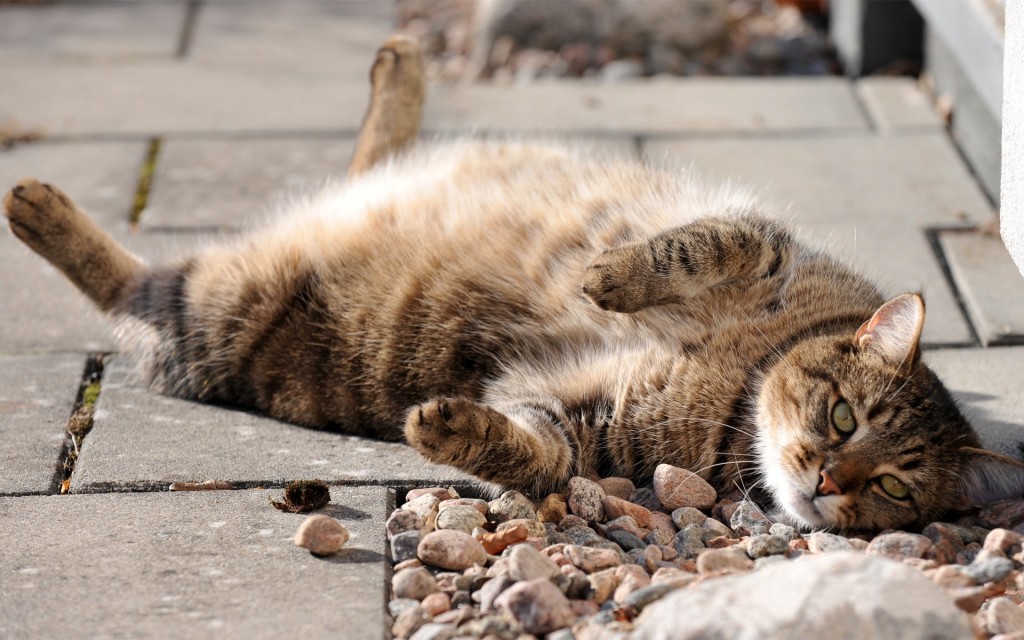
The most common myth is that cats become obese after castration.
Myth 1. Neutered cats lose interest in games and become lazy.
After surgery, cats become calmer, yell less at night, demanding a cat, and do not mark. But the playfulness inherent in the cat family remains at the same level or even increases - after all, the extinguished instinct of reproduction is replaced by the excitement of the hunt. A castrated cat behaves like a kitten.
Myth 2. After castration, cats are susceptible to obesity and disease.
With rational feeding and care, their chances of getting sick and gaining excess weight are no greater than their non-castrated counterparts.
Myth 3. A village cat cannot be neutered - it will stop catching rodents.
Hunting and protective instincts have nothing to do with sexual desire. A cat after castration will still be an excellent mouse catcher, and will chase other people’s cats away in the same way.
Myth 4. If a cat has tried a cat, castration will not calm him down; he will still yell and mark his territory.
Hormones will remain in the animal’s blood for some time, so its behavior will not change dramatically. But gradually he will forget his “bad habits.”
Myth 5. Castrated cats suffer from the fact that they cannot reproduce.
Perhaps the most favorite argument of opponents of sterilization. However, this is not at all true. Logical thinking and comparison of facts are not typical for cats; they do not think like people. A couple of months after the operation, after hormones are removed from the body, the cat will not even remember the reproductive instinct. But a non-castrated animal, unable to satisfy its needs, will really suffer.
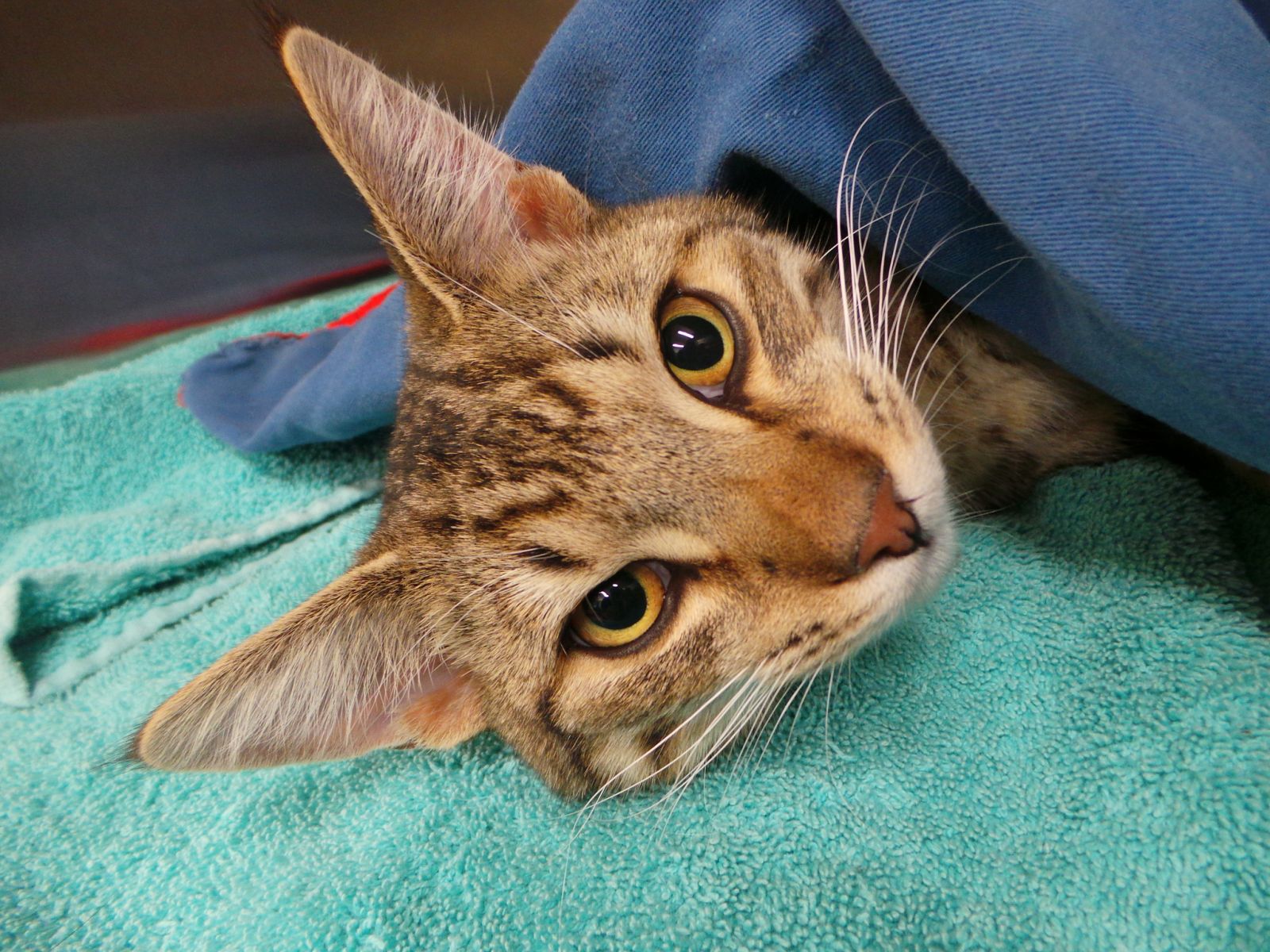
Neutered cats have many more advantages
For experienced breeders and owners, as well as practicing veterinarians, the advantages of cat castration are obvious:
- the cat’s character and behavior change for the better, he becomes more friendly, aggression towards people and other animals disappears;
- the rhythm of a cat’s life adapts to its owners – it sleeps at night, communicates more actively with the owner, and plays with him more willingly;
- attempts to run outside in search of the cat stop;
- the cat stops marking its territory, and even the smell from the litter box becomes less pungent, since there are no hormones in the urine;
- castrated cats live two to three years longer on average, which is associated with a lower risk of injury and a decrease in the number of malignant tumors of the genital area;
- a factor that is important not only for owners, but also for the general epidemiological situation - the chance of stray cats breeding is reduced, which means the risk of infection of domestic cats is reduced.
Among the disadvantages of castration of cats, the following can be noted:
- There are a number of contraindications in which anesthesia is dangerous for the health and life of cats - heart disease, age, individual intolerance;
- with improper feeding, there may be a risk of obesity and, therefore, after castration, specialized premium food is recommended, and their price is quite high;
- If castration is performed carelessly, infection and other complications are possible - it is important to choose a clinic and surgeon with a good reputation and experience for this operation.
If you are in doubt about castrating your cat or not, then watch the video from veterinarian Igor Aleksandrovich Umansky.
Or maybe we can get by with drops?
Veterinary pharmacies and pet stores sell drugs, often in the form of drops or tablets, that suppress the animal’s sexual desire. Hesitant about castration, owners often ask the veterinarian if drops can be used?
Most experts agree: drops can be used, but only as a temporary measure. If the behavior of your cat, who has reached puberty, causes him and you trouble, it is better not to delay castration, but to carry it out at a young age, with minimal risk of complications.
Regular and prolonged use of drops is harmful to the health of the cat and can lead to malignant formations.
Where and when is the best time to have surgery?

The most reliable option for cat castration is a clinic
The most reliable and optimal option is to castrate the cat in the clinic. This operation is not complicated, does not involve penetration into the peritoneum, but the clinic ensures the sterility of the instrument and there is the possibility of emergency assistance if it suddenly turns out that the cat has an individual intolerance to the drugs.
You can also castrate a cat at home; in this case, you should carefully consider the choice of a veterinary surgeon and make sure that he has experience in performing such operations.
Try to set a date for surgery so that you have a couple of days to monitor your pet's health. Considering the requirements for a fasting diet, it is better to prescribe it in the morning - this way the pet will experience less stress.
How to prepare a cat for castration
No special preparation is required for this simple operation. The cat should not be fed 12 hours before surgery, and water should not be given 3-4 hours before surgery. During anesthesia, animals reflexively vomit, and pieces of food can enter the bronchi and lungs. Therefore, the cat's stomach must be empty.
If your cat had heart problems and you noticed symptoms such as shortness of breath, coughing, lethargy and inactivity, be sure to consult your veterinarian in advance!
Perhaps he will offer to undergo an examination, or completely prohibit the operation for medical reasons.
Castration: how it happens

Castration takes place under anesthesia
At the clinic, the cat will be weighed and examined, after which he will be given an injection - anesthesia. Gradually the cat will fall asleep and lose sensitivity. The operation itself does not last long: the surgeon makes two small incisions in the scrotum, applies clamps to the spermatic cords and removes the testes. The incisions are sutured, the surgical site is treated with an aseptic solution, and the cat is placed for observation for about an hour.
Once the cat begins to recover from anesthesia, it can be taken home. Clinics may offer, for a fee, to leave the cat in the hospital for another day for observation. This is not necessary, especially if we are talking about a young and healthy animal, but the owner always has the right to accept this offer.
Condition of the cat after anesthesia and surgery
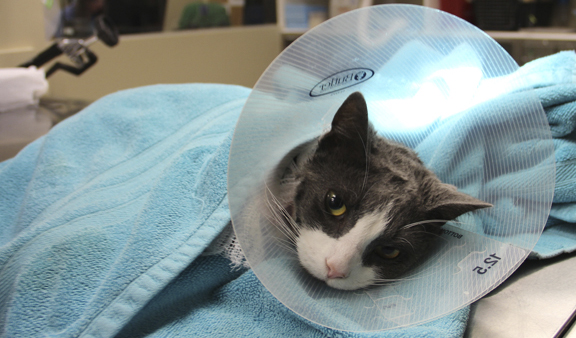
Normalization of the cat’s condition occurs from 2 hours to 2 days
From the moment the cat wakes up after anesthesia until its condition is completely normalized, it usually takes from several hours to two days - this is individual. Coordination of movements may be impaired in animals; the cat may walk aimlessly around the apartment. Sometimes there is inhibition. These symptoms go away quickly.
If the cat becomes thirsty, water can be offered 4 hours after surgery. Food can be given no earlier than the next day. During the first few days, it is necessary to monitor the animal’s stool and urination; if there are problems, consult a veterinarian.
Cats rarely experience pain at the incision site. You need to make sure that the pet does not lick the seams, and treat it once a day with an aseptic solution, for example, brilliant green. If a cat stubbornly licks the scrotum, it is recommended to put a collar on it and inspect the stitches more often in order to notice signs of inflammation in time.
Cat behavior after castration
For the first day or two, the cat will be slightly inhibited and less playful, but already on the third day after castration, the cat’s behavior returns to normal, the animals’ appetite and their normal temperament return. Changes in the cat’s character do not occur immediately, but over several weeks.
What to do if the cat continues to mark?
The most common reason for castration is cited by cat owners as their habit of marking shoes, furniture and corners in the apartment. This behavioral feature is caused by the animal’s need to protect its territory from rivals and to make itself known. This style of behavior in the cat is “prompted” by the hormones produced by the testes. During castration, the testes are removed, but some of the hormone remains in the body, encouraging the cat to continue the same behavior. Gradually, the hormones are eliminated from the body, the cat loses the hunt, and as a result, it stops marking its territory.
Watch the video from veterinarian Timur Aleksandrovich Stadnikov, he will talk about the positive and negative aspects associated with castration of a cat, we wish you a pleasant viewing.
Features of cat behavior before and after castration, differences from sterilization, how the operation is carried out, preparing the animal and caring for it, problems and dangers.
Features of cat behavior before and after castration

So, you don’t want to breed your purr, and you don’t want to castrate it either. Of course, every owner wishes only the best for his pet. Many people believe that subjecting their family friend to such manipulation is cruel. Your furry pet cannot make a decision on its own and give consent to this; everything will be on the conscience of the owner of the four-legged animal. “We are responsible for those we have tamed.” (Antoine de Saint-Exupéry). Breeders without relevant experience cannot even imagine how much trouble and problems an adult, sexually mature animal can cause. Let's weigh the pros and cons.
Some cats mature very early - already by 6–9 months. Animals have no concept of pleasure and “sex”; they have an instinct for survival. That is, they need to prolong the existence of their species on earth. The pet's body itself lets you know when it's time to reproduce. To satisfy the needs of “love”, an adult sexually mature male needs at least three to seven females in heat per year, with a frequency ranging from approximately several times every two weeks to once a day (depending on the temperament of the particular animal).
So it is a mistaken opinion if the owner thinks that the “wedding” of a cat once or at most six times in his entire life will bring him satisfaction and great happiness. When there is a rapid release of hormones, and in some individuals it is very high, you cannot predict the behavior of your mustachioed friend. Usually it all starts with songs and trills in different modes. The newly made “groom” will entertain you with serenades both day and night.
Almost all macho males mark their territory: corners, upholstered furniture, personal belongings - that is, anything in your home. It also goes to people who come to the house. There is no escape from the stench; it is almost impossible to completely wash and remove the “wonderful” smell. Due to a sharp release of hormones, the animal may begin unscheduled molting. You will have to constantly brush your furry friend, not to mention frequent cleaning of the apartment.
Missing their lady, cats lose their appetite and lose weight. There are specimens whose aggressiveness increases and their character deteriorates. Big percentage the owners of “walking” male cats were scratched precisely during this difficult period. Some received very serious injuries, but wounds from the claws of mustachioed tabby cats take a very long time to heal. There is even felinosis disease - a bacterial disease after damage received from cats. Bacteria enter the wound on the skin, and the infection affects the surrounding tissue.
Many simply run away in search of “love” - it’s good if it’s through the door, but there are also windows in the house, and not only on the ground floor. Even with a successful landing, there are many other dangers that lurk on the street: aggressive dogs, vehicles, knackers. And then tragedy strikes the whole family, especially young children. And first of all, you will only have yourself to blame.
Of course if you have a private house, and the cat is walking outside, you don’t have to castrate him. He will find his own brides and satisfy his sexual needs. But he cannot do without injuries and various diseases, because the primacy of “love” will have to be defended in battles with other contenders. If you have a free-roaming pet, give it a routine vaccination at least once a year. Even if he becomes infected with something from his fellow humans, the disease will go away in a milder form.
The operation to castrate a cat does not affect its psychological state and hunting instincts. A neutered furbaby lives a longer, calmer, and healthier life. The pet does not need to run away from home in search of girlfriends. The risk of contracting sexually transmitted diseases and infectious diseases is reduced to almost zero. The mustachioed tabby becomes more attached to the owner and reverently loves his household, becoming a pleasant house purr. Now the male cat does not want to run away from home in search of a bride and there is no need to do so. And you can sing only if the bowl is empty.
Among people who have incorrect information, there is a false belief that neutered cats tend to become overweight and lazy. The metabolism of a furry friend decreases after the manipulation and it all depends on how the owner cares for his pet. If a mustachioed animal is fed uncontrollably, then it will be extremely difficult for a fat animal to move. So the diet should be organized intelligently: systematically, taking into account the individual needs of your “glutton”. It is necessary to create conditions for the cat to play outdoors - be sure to find time for this.
If we talk about sedatives, then today there are no completely safe drugs. In general, they negatively affect the health of the animal. The endocrine system is damaged, causing various diseases of the genitourinary system. This is also not a way out of the current situation.
Differences between castration and sterilization

Sterilization and castration are two fundamentally different operations that have different results. When male cats are sterilized, their spermatic cords are tied. At the same time, the animal maintains hormonal levels and sexual function. His behavior does not change, he only becomes incapable of reproducing future offspring. When a cat is castrated, the testes are completely removed and the hormonal levels decrease. The animal is not capable of reproduction and behaves completely differently.
What is cat castration, how and where is it carried out?
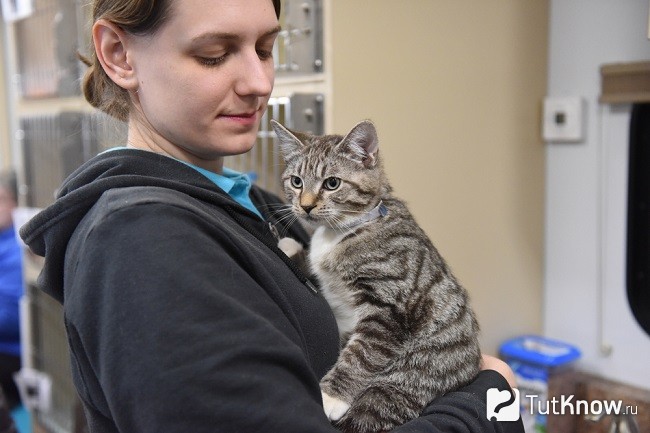
“Castration” translated from Greek means emasculation. The operation is performed under general anesthesia and takes approximately 5 to 25 minutes. The cat's scrotum is incised, the testes are removed, special threads are placed on the spermatic cords to prevent bleeding, and finally the testes are removed. If you want the best for your pet, then look for professional, specialized veterinary clinics with experienced, certified specialists.
Many people without hesitation search for would-be doctors on the Internet and get the appropriate result. There are animals for which such “specialists” remove only one testis. Then comes inflammation, very serious complications and repeated surgery. Owners, be vigilant, do not trust charlatans with your beloved pet. Then your friend at home will pay first!
An important aspect when castrating a cat is anesthesia; the patient’s well-being depends on it. There are: intramuscular, intravenous, inhalation anesthesia. As a rule, most experienced doctors use a combination of these anesthesia in order to ensure proper medicated sleep, high degree pain relief, as well as easy and quick awakening of the patient.
Preparing a cat for castration
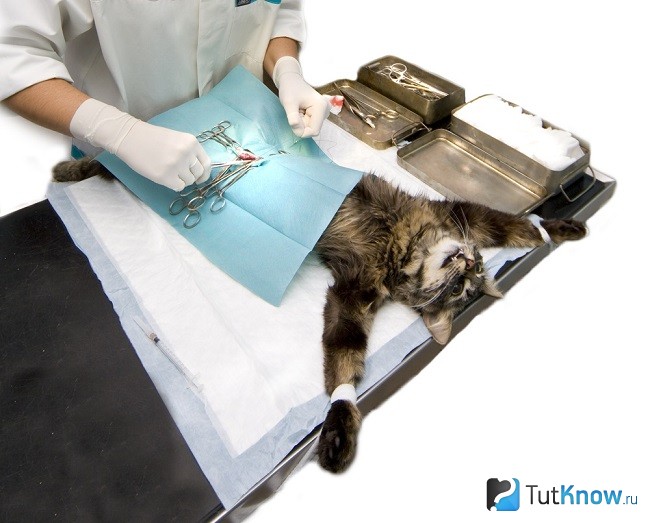
The age of the cat for the manipulation must be from seven months to a year - that is, the animal’s entire body must be fully formed. If this is done at an earlier age, then the unformed genitourinary system will not allow the urethra to fully develop, and the pet will have major problems with urination.
Later, if the furry macho has already mated, castration may not give the result you expected. The fact is that when the cat is not yet “untied” (has not had contact with the cat), the testes produce sex hormones, and after mating with the cat, the adrenal glands and pituitary gland begin to secrete. Therefore, your male will simply become infertile, and his behavior will probably remain almost the same. According to statistics, 5–10 percent of cats behave as if manipulation had not been carried out on them. At the age of 8–10 years, it is dangerous to castrate some moustaches; the body may react poorly to anesthesia.
The cat must be vaccinated or revaccinated no later than two weeks before castration, and be sure to get rid of worms. To avoid complications during surgery, the mustache-striped stomach must be empty - you can’t eat, but you can drink. The animal is also examined by a veterinarian and determines the general condition of the body: the skin and fur are palpated, the lymph nodes and mucous membranes are checked, the heart and lungs are auscultated, the abdomen is palpated and the body temperature is measured. If necessary, they do ultrasound diagnostics and take blood and urine tests of the cat.
Postoperative care for a neutered cat
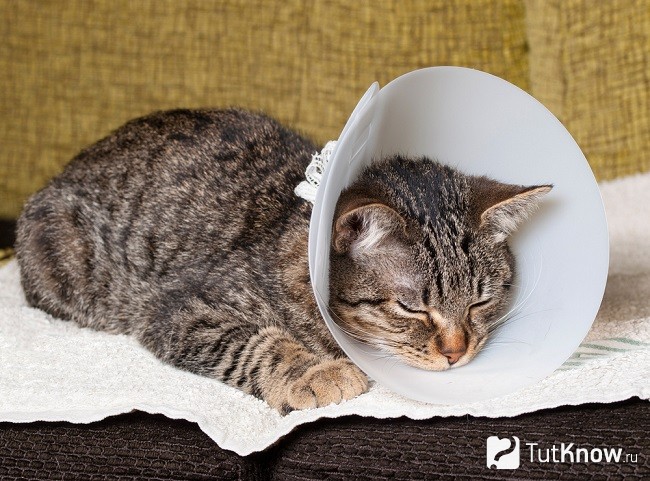
No special manipulations are required for the animal after castration. Since during the operation the animal’s eyes are open and the mucous membrane of the eyes is dry, subsequently, for some time, it is necessary to instill the eyeballs with special moisturizing drops.
Then, when the cat comes out of anesthesia, its muscular system is relaxed, so poor coordination of movements may be observed for several hours. To avoid falls, until movement is restored, make sure that he does not climb onto high surfaces. After the manipulation, the patient's body temperature is reduced. To prevent your pet from catching a cold, it must be placed in warm place and wrap it in a blanket.
After anesthesia, some cats may vomit, so you need to feed minimally. The patient must have free access to water. For the best effect, a special collar is put on the mustache for several days so that it does not lick the operated area, the stitches do not come apart, and the wound does not become infected. This way everything will heal faster.
After castration a few weeks later, the macho hormonal levels decrease. The animal is not capable of reproductive function. Manifestations of aggression stop, the cat becomes sweet, calm and flexible. The animal no longer marks its territory.
Benefits of castrating a cat

- is not distracted by reproductive function, becomes more attached to the owner and family members;
- does not run away from home in search of a “wife”;
- there is no need for songs and trills to attract females;
- does not mark the territory in a house or apartment (your favorite personal and household items will be safe and sound);
- less susceptible to infection by infectious and venereal diseases;
- A neutered cat has a reduced risk of developing diseases reproductive organs(for example, prostate adenoma, testicular cancer, urolithiasis);
- the likelihood of getting injured and wounds while fighting for primacy to be the “groom” is reduced to a minimum (costs for the services of veterinary hospitals are reduced);
- metabolism decreases, and a castrated cat consumes less food (saving on the amount of food);
- your friend’s life expectancy increases, diseases become fewer (he will delight the whole family with his presence for many years).
Problems and dangers that an uncastrated cat is exposed to

- In search of a female, it may try to escape from the home. Such attempts mean big problems for the animal: falling from a height, getting lost on the street, getting injured by other cats and stray dogs, getting hit by a car, falling into the hands of cruel people.
- A cat can become infected with sexually transmitted diseases from a friend.
- When you come into contact with other animals on the street, the risk of contracting various diseases increases.
- During your life, there is a high probability of developing diseases of the reproductive organs, such as testicular cancer, prostate adenoma, and urolithiasis.
- Frequent mood changes.
- Refusal to eat, weight loss.
- Hair loss due to a sharp change in the level of hormones in the cat’s body.
Troubles facing the owner of an uncastrated cat
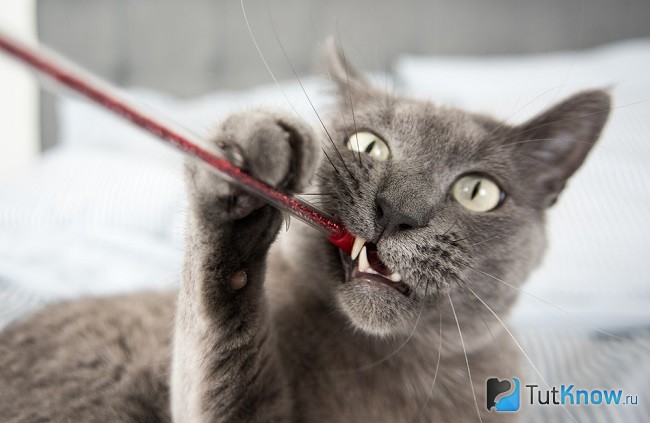
- loud, 24/7 exhausting songs;
- terrible-smelling, unremovable marks on everything in the house, including not only your personal belongings, but also the belongings of guests who come to the house;
- constant combing of the furry and frequent cleaning of the apartment;
- treatment of an injured animal by a veterinarian;
- the risk of being injured by an aggressive “macho”;
- your irritation at this behavior of the cat, and you think: “Who should push him off?”
False conclusions about castration of cats

For some reason, many inexperienced owners of furry friends think that this operation is painful and unsafe. In veterinary clinics, anesthesia is used before the procedure and the animal does not feel anything. The postoperative recovery period does not last long, just a few days.
Many people believe that a neutered cat will be deprived of the joy of sexual intercourse, which he really needs. Your opinion is wrong. If you cannot provide your macho man with regular dates and sexual contacts with brides, then expect appropriate behavior. Your cat will be aggressive and irritable and may scratch you. You will constantly look for the missing pet, and if you find it crippled and sick, treat it. He definitely won’t let you sleep at night - he will sing songs in every way. Get ready to smell the “divine” smell of his marks that lingers forever, and also frequently clean up fur throughout the apartment.
It's up to you to decide what's best for your beloved cat. Indeed, in some cases, you will not be able to change anything. Evaluate the pros and cons well. We wish you success!
Myths and truth about castration of cats in this video:



















